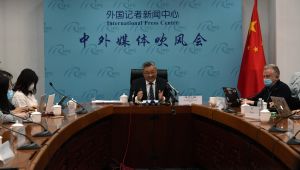PRESIDENT GEORGE W. Bush's decision to award President Vladimir Putin the unique distinction of a weekend in Kennebunkport with two American presidents flummoxed supporters and critics alike. Over the past year, no international leader has been more critical of the president than his Russian guest.
From his January State of the Union reference to "Comrade Wolf," to his recent comparison of Bush's America to Hitler's Third Reich, Putin has many chattering about a new Cold War. Moreover, in preparing for election of a new parliament in December and new president next March, Putin has tightened Kremlin's grip on all instruments of power, from the economy to the press. Why then did
Bush decide to reward what most American opinion leaders believe he should be condemning? Senator John McCain, for example, has called for Russia to be evicted from the G-8 club of leading industrial democracies.
Bush and Secretary of State Condoleeza Rice made the right decision in inviting Putin on the basis of a sound assessment of how best to advance American national interests. Four considerations informed their judgment.
First, hysterics aside, Russia is not the Soviet Union, and the United States is not entering a new Cold War.
For four decades the Soviet Union was America's focal enemy. A Communist totalitarian government consumed 40 percent of its gross national product in a military-dominated state whose troops occupied what Ronald Reagan rightly called an "evil empire."
Today, Russia's borders have shrunk back to territory controlled by Catherine the Great 200 years ago. Russia now spends $1 on defense for every $11 in the American defense budget. In short, this is not his father's Soviet Union.
Second, President Bush understands that Russia is a former superpower struggling to recover its balance.
For Russia, the 1990s were a traumatic roller coaster ride that turned the society upside-down and inside out. Over the decade, the Soviet Union disappeared to be replaced by Russia and 14 newly independent states; a centrally commanded and controlled economy was destroyed in an economic depression worse than the great American depression; and Communism was buried.
A superpower rival of the United States became a supplicant, groveling for economic assistance. Under Putin, Russia's economy has grown at 7 percent per year; Russia's debt has been repaid; Russia has emerged as a petro-power.
Third, as a fellow politician, Bush understands the power of public symbols.
In both countries, baiting the former Cold War adversary is politically productive. Especially in a society that felt humiliated and thus craves to be proud of their country, Putin's readiness to stand up to the world's sole superpower has given him the highest approval rating among his fellow citizens of any leader in the world today. Thus especially when cooperating, Putin is always at pains to describe this in his own term -- not as concessions to the United States.
Fourth and most important, as the president stated bluntly at the Kennebunkport press conference, the United States needs Russia.
Success in combating the greatest threats to Americans' security and well-being requires Russia's active cooperation. Iran is only the most urgent illustration of the central proposition: Without deep Russian cooperation, the United States has no hope of preventing the proliferation of nuclear weapons, nuclear terrorism, and nuclear war.
Words aside, Putin's hidden hand has been extremely helpful in the current bargaining with Iran: delaying completion of the civilian nuclear reactor at Bushehr, refusing to supply nuclear fuel to Iran, and urging Iran to accept an arrangement in which fuel for its civilian nuclear reactors would be produced by an international consortium outside Iran.
Russia has joined the United States in three UN resolutions calling on Iran to suspend enrichment of uranium and enter negotiations. As Bush underlined at the press conference, when the United States and Russia stand together, Iran takes note.
Bush was right to host Putin in a setting conducive to serious conversation about how they can block Iran's acquisition of nuclear bombs.
In the weeks ahead, expect the two countries to move directly to conduct a joint assessment of the Iranian threat on the basis of which they produce a joint strategy for stopping Iran. The unnecessary controversy over missile defenses against nuclear warheads delivered by Iranian missiles can readily be resolved in that context since such defenses would be required only if the United States and Russia fail to prevent Iran's acquiring nuclear bombs.
The proof of what was achieved at this "lobster summit" will be in Russian and American actions in the months ahead. But if by this invitation, Bush solidified Putin's cooperation as a real partner in stopping Iran, Kennebunkport will be noted by historians as an accomplishment of which two soon-to-be former presidents can be proud.
Graham Allison is director of the Belfer Center for Science and International Affairs at Harvard's Kennedy School of Government and author of "Nuclear Terrorism: The Ultimate Preventable Catastrophe."
Allison, Graham. “The Lobster Summit.” The Boston Globe, July 5, 2007



